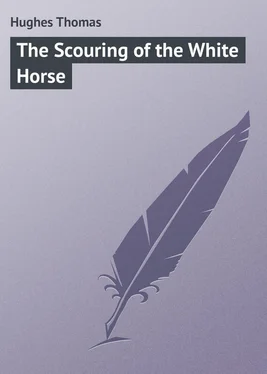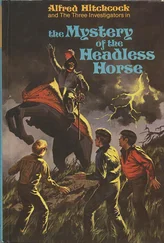Thomas Hughes - The Scouring of the White Horse
Здесь есть возможность читать онлайн «Thomas Hughes - The Scouring of the White Horse» — ознакомительный отрывок электронной книги совершенно бесплатно, а после прочтения отрывка купить полную версию. В некоторых случаях можно слушать аудио, скачать через торрент в формате fb2 и присутствует краткое содержание. Жанр: foreign_prose, на английском языке. Описание произведения, (предисловие) а так же отзывы посетителей доступны на портале библиотеки ЛибКат.
- Название:The Scouring of the White Horse
- Автор:
- Жанр:
- Год:неизвестен
- ISBN:нет данных
- Рейтинг книги:5 / 5. Голосов: 1
-
Избранное:Добавить в избранное
- Отзывы:
-
Ваша оценка:
- 100
- 1
- 2
- 3
- 4
- 5
The Scouring of the White Horse: краткое содержание, описание и аннотация
Предлагаем к чтению аннотацию, описание, краткое содержание или предисловие (зависит от того, что написал сам автор книги «The Scouring of the White Horse»). Если вы не нашли необходимую информацию о книге — напишите в комментариях, мы постараемся отыскать её.
The Scouring of the White Horse — читать онлайн ознакомительный отрывок
Ниже представлен текст книги, разбитый по страницам. Система сохранения места последней прочитанной страницы, позволяет с удобством читать онлайн бесплатно книгу «The Scouring of the White Horse», без необходимости каждый раз заново искать на чём Вы остановились. Поставьте закладку, и сможете в любой момент перейти на страницу, на которой закончили чтение.
Интервал:
Закладка:
A very curious story is told of why they came over here; and as it goes at first sight against a good many of our notions of how the world is governed, and so ought to make us think a little more about the matter, I shall give it you pretty much as it is told by the old chronicler, John Brompton.
“There was a man of royal birth in the kingdom of Denmark, named Lodbroc, who had two sons, Hinguar and Hubba. This man embarked one day with his hawk in a small boat to catch ducks, and other wild-fowl on the adjoining sea-coasts and islands. A terrible storm arose, by which Lodbroc was carried away and tossed for several days on every part of the ocean. After numberless perils, he was cast ashore on the coast of Norfolk, near the village of Redham,” (at least that must be the name, as I read it in Brompton, though I have not been able to hear of a village of that name on the coast of Norfolk,) “where he was found having his hawk alone for his companion, and presented to King Edmund. That king, struck with the manliness of his form, kept him at his court, and heard from his own mouth the history of his adventures. He was then associated with Berne, the king’s huntsman, and indulged in all the pleasures of the chase, for in the exercise of both hunting and hawking he was remarkably skilful, and succeeded in capturing both birds and beasts according as he had a mind.” In fact, Lodbroc was the sort of man to please King Edmund, for the art of capturing birds and beasts was, next to the art of fighting for one’s home and country, the art most esteemed amongst the Anglo-Saxons; who acknowledged “that skill and good fortune in this art, as in all others, are among the gifts of God, as we also have often witnessed.” But to go on with our story. “The skill of Lodbroc bred jealousy in the heart of Berne the huntsman, who one day, as they went out together hunting, unawares set upon Lodbroc, and having foully slain him, buried his body in the thickets of the forest. But Lodbroc had a small harrier dog, which he had bred up from its birth, and which loved him much. While Berne the huntsman went home with the other hounds, this little dog remained alone with his master’s body. In the morning, the king asked what had become of Lodbroc, to which Berne answered that he had parted from him yesterday in the woods, and had not seen him since. At that moment the harrier came into the hall and went round wagging its tail, and fawning on the whole company, but especially on the king; when he had eaten his fill, he again left the hall. This happened often; until some one at last followed the dog to see where he went, and having found the body of the murdered Lodbroc, came and told the story to the king. The affair was now carefully inquired into, and when the truth was at last found out, the huntsman was exposed on the sea, without oars, in the boat which had belonged to Lodbroc. In some days, he was cast ashore in Denmark, and brought before the sons of Lodbroc; who, putting him to the torture, inquired of him what had become of their father, to whom they knew the boat belonged. To this Berne answered,” as one might have guessed he would answer, he being a liar and cowardly murderer, “that their father Lodbroc had fallen into the hands of Edmund, King of East Anglia, by whose orders he had been put to death.” Now, King Edmund was a wise and righteous man, who “devoutly undertook the government of the East Angles, and held it with the right hand of power, always adoring and glorifying God for all the good things which he enjoyed;” 3 3 See Simeon, A.D. 870.
and it is a pity he did not on this occasion remember, that having safely caught a great scoundrel, the best thing to do with him was to see him hung out of the way himself; for, by letting him go, you see, he gave a chance to the devil, who can’t afford to lose such gentlemen as Berne the huntsman out of the world, and has considerable grudges against kings like Edmund.
Well, when Hinguar and Hubba heard the tale of Berne the huntsman, they, like good and true sons, according to the notions of piety then current amongst the Danes, hastened to fit out a fleet to invade England, and avenge their father. And their three sisters wove for them the standard, called the Raven, in one day – which flag waved over many a bloody field, from Northumbria to Devonshire, until it was taken by King Alfred’s men, under Odda, the Alderman of Devon, before a certain castle in that county, which is called Cynuit by Asser, and Kenuith elsewhere, (the situation of which castle I cannot identify, or the name,) where were slain King Halfdene, a brother of Hinguar and Hubba, and 840 Danish warriors. It was said, that when the Danes were about to gain a battle, a live crow would fly before the middle of the standard; but if they were to be beaten, it would hang motionless. 4 4 See Chronicle of St. Neot, A.D. 878.
So Hinguar and Hubba, as has been said, landed in the country of the East Angles, in the late autumn, bent on vengeance. King Edmund knew nothing of the blood-feud between him and these Danish leaders, by reason of Berne’s lying story, so took no more than the usual measures for preparing to attack them; but whether it was that they found King Edmund too strong for them at the time, or for some other reason, they seem to have wintered there quietly, and to have bought horses, and made some sort of truce with the East Angles. 5 5 See Saxon Chron. and Asser, A.D. 866.
But in the spring of the year 867, they crossed the Humber, marched hastily upon York, and took it.
The kingdom of Northumbria was just the place for the army of Pagans and the standard Raven at this time; for it was divided against itself. Osbert, the rightful king, had been playing Tarquin in the house of Bruern Brocard, one of his chief earls; so his people had cast him out, and had taken to themselves a king Ælla, of unkingly blood, and the two were warring against one another when the Danes took York. Late in the autumn, however, a peace was made between Osbert and Ælla, and they marched to York; where within the very walls of the city into which the Northumbrians penetrated, was fought a most bloody battle. In that fight fell almost all the Northumbrian warriors, and both the kings, and a multitude of noble men; and the remainder who escaped made peace with the Pagans. 6 6 See Asser, A.D. 867.
By this time, no doubt, there was small spoil left for Hinguar and Hubba north of the Humber.
Accordingly, in the year 868, the pagan army, leaving Northumbria, marched into Mercia, and surprised and took Nottingham. Then Burhred, King of Mercia, and his witan sent to Æthelred, king of the West Saxons, to come and help them. And Æthelred and Alfred marched to Nottingham with the West Saxon power, and with Burhred besieged the Pagans, there; but they could not force the wall, and there was no great battle, and Æthelred and Alfred went home with their troops. But the Pagans, after wintering at Nottingham, made peace with Burhred and the Mercians; that is to say, such a peace as they loved to make – I mean a peace till it was worth their while to come again; for in 874 they came back, drove King Burhred over the sea, and subdued the whole country – and Burhred went to Rome and died there, and his body lies in St. Mary’s Church at the English School. 7 7 See Saxon Chron. and Huntingdon, A.D. 874.
In the year 869, “the aforesaid army of Pagans, galloping back to Northumbria, went to York, and there passed the winter;” or, in the words of Huntingdon, “remained there cruelly for one year.” And what sort of a winter was it for the poor Yorkshiremen? “There was again a great famine, a mortality among men, and a pest among cattle.” Such is the fate of a divided people which can only make truces with its oppressors.
Читать дальшеИнтервал:
Закладка:
Похожие книги на «The Scouring of the White Horse»
Представляем Вашему вниманию похожие книги на «The Scouring of the White Horse» списком для выбора. Мы отобрали схожую по названию и смыслу литературу в надежде предоставить читателям больше вариантов отыскать новые, интересные, ещё непрочитанные произведения.
Обсуждение, отзывы о книге «The Scouring of the White Horse» и просто собственные мнения читателей. Оставьте ваши комментарии, напишите, что Вы думаете о произведении, его смысле или главных героях. Укажите что конкретно понравилось, а что нет, и почему Вы так считаете.












